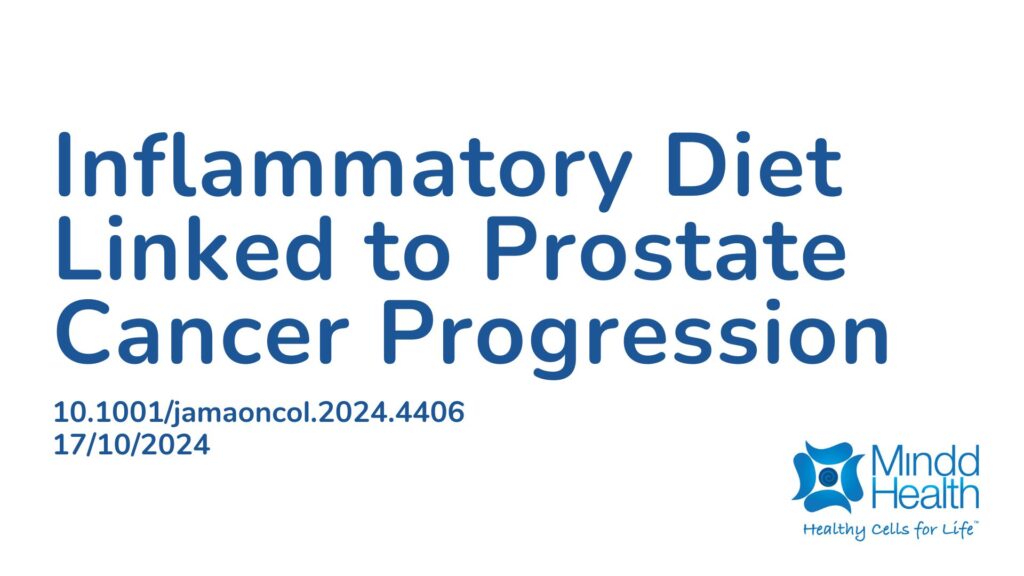Summary:
Research is still unclear as to whether diet has the impact to stop the progression of prostate cancer in men who have already been diagnosed. The goal of this study was to see if diet quality, particularly inflammatory foods, is linked to prostate cancer progression in men with GG1 prostate cancer. This study followed 886 men diagnosed with GG1 prostate cancer who were undergoing active surveillance by their medical practitioners. They completed a food frequency questionnaire to report their dietary habits. The researchers examined how closely their diets aligned with the Dietary Guidelines for Americans, as well as how many foods were high in energy or listed on the Dietary Inflammatory Index. They then looked at whether the men’s prostate cancer progressed to GG2 or more serious stages requiring more intensive curative treatment. The study followed 886 men, and after a follow-up period of 6.5 years, 187 men (21%) had their cancer progress to GG2 or worse, and 55 men (6%) progressed to GG3 or worse. The risk of cancer progression was 7% at 3 years, 15% at 5 years, and 33% at 10 years. Men with greater adherence to a healthy diet had a significantly lower risk of cancer progression, particularly for more extreme cases. The authors concluded that men with early stages of prostate cancer may reduce their risk of cancer progression, including significantly more severe types of prostate cancer, by following a diet that aligns closely with a healthier style of eating and the American Dietary Guidelines. The main principles of the American Dietary Guidelines are to eat a high amount of fruits, vegetables, nuts, seeds, grains, and lean meats, moderate amounts of various types of fish and good-quality proteins, and low amounts of sugar and sodium.
Abstract:
Importance It remains unclear whether diet may influence the risk of prostate cancer grade reclassification in men undergoing active surveillance. Objective To assess the association of diet quality and dietary inflammatory potential with prostate cancer grade reclassification during active surveillance. Design, Setting, and Participants This prospective cohort study included men diagnosed with grade group (GG) 1 prostate cancer from January 2005 to February 2017 who were undergoing active surveillance and at active surveillance enrollment prospectively completed a validated food frequency questionnaire regarding their usual dietary patterns. Data were analyzed from October 29, 2023, to June 17, 2024. Exposures The Healthy Eating Index 1999-2000 (HEI) and energy-adjusted HEI (E-HEI) scores as a measure of adherence to the Dietary Guidelines for Americans and the Dietary Inflammatory Index (DII) and energy-adjusted DII (E-DII) scores as metrics of dietary inflammatory potential were calculated using self-reported diet data. Main Outcomes and Measures A competing risk regression was performed to test the baseline HEI, E-HEI, DII, and E-DII scores for an association with grade reclassification to GG2 or greater or GG3 or greater (ie, extreme grade reclassification) during active surveillance, adjusting for established active surveillance prognostic factors and smoking history at baseline. Results The study included 886 men (median age at diagnosis, 66 years [IQR, 61-69 years]). After median follow-up of 6.5 years (IQR, 4.0-9.1 years), 187 (21%) had grade reclassification to GG2 or greater, including 55 (6%) with extreme grade reclassification. The cumulative incidence of grade reclassification was 7% (95% CI, 5%-9%) at 3 years, 15% (95% CI, 12%-17%) at 5 years, and 33% (95% CI, 29%-37%) at 10 years; that of extreme grade reclassification was 2% (95% CI, 1%-4%) at 3 years, 4% (95% CI, 3%-5%) at 5 years, and 10% (95% CI, 7%-13%) at 10 years. Higher baseline HEI (subdistribution hazard ratio [SHR], 0.85; 95% CI, 0.73-0.98; P = .03) and E-HEI (SHR, 0.86; 95% CI, 0.74-1.00; P = .047) per 1-SD increase in score were associated with a significantly lower risk of grade reclassification. Higher baseline HEI (SHR, 0.72; 95% CI, 0.57-0.93; P = .01) and E-HEI (SHR, 0.73; 95% CI, 0.57-0.94; P = .01) per 1-SD increase in score were associated with a significantly lower risk of extreme grade reclassification. Neither the baseline DII nor E-DII was associated with either grade reclassification outcome (eg, for grade reclassification to ≥GG2, the SHR was 1.08 [95% CI, 0.93-1.26] per 1-SD increase in DII score and 1.02 [95% CI, 0.86-1.21] per 1-SD increase in E-DII score). Conclusions and Relevance The findings suggest that in men diagnosed with GG1 prostate cancer undergoing active surveillance, higher adherence to American dietary guideline recommendations may be associated with a lower risk of grade reclassification, particularly to GG3 or greater disease, which mandates curative treatment.
Article Publication Date: 17/10/2024
DOI: 10.1001/jamaoncol.2024.4406




